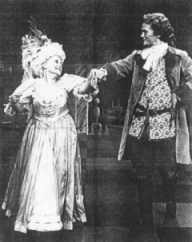
Young Marlow, at the
ordering of his father, is traveling to the country
estate of his father's best friend, Mr. Hardcastle to
explore the possibility of marrying Hardcastle's daughter
Kate. Marlow's friend, Hastings, comes along because
Kate's cousin and best friend Constance -- Hastings' love
interest -- is a ward of the Hardcastle family.
Marlow's only problem is that he is too shy with women of
his own social class, though he is quite bold with
servant girls. Hastings problem is that, besides
Constance, he also values her dowry of jewels which are
in the possession of his love's aunt, Mrs. Hardcastle.
She wants Constance to marry her son by a previous
marriage, Tony Lumpkin.
To thwart Hastings advances, and also -- just for fun --
Tony tricks Marlow and Hastings into thinking that
Hardcastle's estate is an inn. So Marlow and Hastings --
especially the snobbish Marlow -- treat the country
gentleman like an innkeeper.
More misunderstandings follow, of course. Seeing what a
shy ass Marlow is, Kate determines to trick him into
thinking she is a servant girl. In that guise she stirs
his desire, then through adroit maneuvering Kate raises
herself to the status of a gentle relation -- poor but
otherwise socially acceptable. Yet as he grows warmer,
she grows more aloof.
Meanwhile the ardent young Hastings in pursuit of
Constance expostulates, nearly babbling with eagerness
and frustration, "My dear Constance, why will you
deliberate thus? If we delay a moment, all is lost for
ever….Let us fly, my charmer." The object of
his affection has only just barely escaped being taken
away by her aunt to a three year confinement in the house
of a distant relative, and Hastings is all adither at the
possibility that she will slip from his grasp. "Let
us date our happiness from this very moment."
Hastings' feelings have driven him to such a state that a
foolish speech escapes his lips, "Perish fortune.
Love and content will increase what we possess beyond a
monarch's revenue. Let me prevail."
All this does not make Hastings a bad fellow. On the
contrary, his willingness to spurn the jewels that are
his sweetheart's rightful inheritance is proof that he is
no mercenary fortune hunter like his friend. Hastings has
a single flaw that must be corrected. Constance, like her
friend Kate, must provide the balancing force that will
give him an even keel for their journey through life
together. Hastings is hasty but Constance is constant.
She replies, "No, Mr. Hastings; no. Prudence once
more comes to my relief, and I will obey its dictates. In
a moment of passion fortune may be despised, but it
produces a lasting repentance." Then she adds the
climactic line of the play. "I'm resolved to apply
to Mr. Hardcastle's (her uncle) compassion and justice
for redress."
Kate, however, growing impatient soon urges Marlow to
leave - since his serious aims seem to be fixed on
fortune. Marlow now proves his own character to be equal
of his friend's, as he realizes money is not what he
really wants. (And we know all along that this is not
only the woman his father wanted him to marry in the
first place, but also that she is really rich as well!)
Synopsized from review by Bruce Begg for Reader
"James
Morrison manages to cut a compelling figure as the
handsome resident straight-man Hastings." Patricia
Freeman for Los Angeles Herald Examiner
"James Morrison is good as Mr. Hastings, a vital and
persuasive performance." Jack Holland for
Drama-Logue

